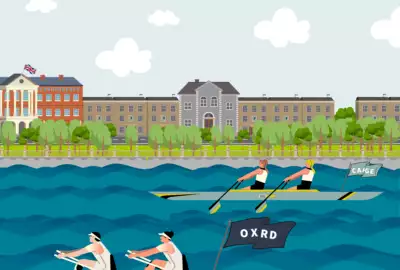Expert Insights
How to Structure Your UCAS Personal Statement: 7 Top Tips
Published 5th September 2025 by Alastair

Your Personal Statement Is Your Story.
When applying to university, your UCAS personal statement is one of the most important parts of your application. It is your opportunity to go beyond grades and exam results and show admissions tutors who you really are. With a strict limit of 4,000 characters, you need to be concise while also offering depth and insight. A strong personal statement demonstrates your motivation, academic potential, and genuine enthusiasm for your chosen course.
This is your chance to tell your story in your own words. The statement should not be a list of achievements, but a carefully considered narrative that reveals your interests, your intellectual journey, and your aspirations for the future.
Want to learn directly from experts?
Watch our exclusive webinar with Camilla for practical advice on how to craft an unforgettable personal statement.
Recorded in December 2025
First impressions matter. Start with a sentence that captures the reader’s attention and sets the tone for the rest of your statement. This might be an anecdote, a specific moment that sparked your academic interest, or an idea that made you want to pursue your chosen subject. A good opening draws the reader in and demonstrates authenticity.
Avoid beginning with clichés such as “I have always wanted to study…” Instead, use your opening to show why your subject excites you. For example, reflecting on a particular book, lecture, or real-world event that shaped your thinking can immediately establish your motivation.
The bulk of your personal statement should focus on your academic interests. Explain clearly why you are drawn to your chosen subject and what fascinates you most about it. Try to identify the specific areas, questions, or themes that capture your curiosity.
Universities want to see that you have thought carefully about your choice of course. It is not enough to say that you enjoy science or literature. You need to show depth by identifying what challenges you and why you are eager to study the subject further at university.
Next, provide evidence of how you have prepared for study at a higher level. This could include A-level subjects, projects, coursework, or independent research. Use examples to illustrate your skills.
For instance, you might explain how writing an extended essay on a historical theme taught you to evaluate sources critically, or how completing a challenging maths module developed your problem-solving abilities. Be specific and always link back to how these experiences have prepared you for your chosen degree.
A strong personal statement also demonstrates that you have engaged with your subject beyond the classroom. This might involve work experience, voluntary projects, competitions, or independent reading.
When you write about these activities, remember that reflection is key. Do not simply list what you have done. Instead, explain what you learnt, how the experience influenced your perspective, and why it has strengthened your commitment to your subject. For example, volunteering in a community clinic might have given you valuable insight into the human side of medicine, or a coding competition might have shown you how theory translates into real-world problem-solving.
Admissions tutors want to understand not only why you want to study a subject but also how it fits into your longer-term ambitions. Use part of your statement to link your chosen course with your personal and professional goals.
You do not need to have your career mapped out in detail, but it helps to show that you have thought about how your degree will contribute to your development. Whether you aspire to a particular profession, or whether you are motivated by a broader intellectual journey, make this connection clear.
The conclusion is your final chance to leave an impression on the reader. Summarise your main points and reinforce your enthusiasm for the subject. A confident ending should express readiness for the challenges of university study and highlight your motivation.
Avoid repeating phrases from earlier in the statement or trying to add new information at the end. Instead, focus on creating a sense of closure and reaffirming your suitability.

A good personal statement is rarely written in one attempt. Start drafting as early as possible, ideally in the summer before Year 13, so you have time to reflect, edit, and refine.
Read your statement aloud to check the flow of your sentences and to catch awkward phrasing. Ask teachers, mentors, or a professional consultant to review your work and provide feedback. Constructive criticism will help you clarify your message and ensure that your statement presents you in the best possible light.
| Section | Focus |
|---|---|
| Introduction | Capture attention with an engaging opening and show authenticity. |
| Academic Interest | Explain why you are passionate about your chosen subject. |
| Preparation | Provide evidence of relevant academic work and skills. |
| Extracurriculars | Reflect on meaningful experiences beyond the classroom. |
| Future Goals | Show how the course connects with your ambitions. |
| Conclusion | End with a confident summary of enthusiasm and readiness. |
| Revision | Leave time to refine and seek feedback. |
Writing a strong personal statement can be challenging, especially when you want to make every word count. If you would like tailored support with your UCAS application, Ivy Education offers dedicated UK University Consultancy services. Our team of experienced consultants can guide you through course choices, statement drafting, and interview preparation.
Learn more about our consultancy services here

Your UCAS personal statement is your voice in the admissions process. It should be personal, reflective, and well-structured. By planning carefully, starting early, and focusing on authentic experiences, you can create a statement that truly stands out.
With the right preparation and guidance, your personal statement can become a powerful part of your application that shows universities exactly why you are the right candidate for their course.
Best of luck!
The UCAS personal statement can be up to 4,000 characters or 47 lines of text, whichever comes first. This includes spaces and punctuation.
You should avoid clichés, generic phrases, and exaggerations. Do not simply list achievements. Focus on reflection and show what you learnt from your experiences.
Yes, UCAS sends the same personal statement to all of your chosen universities. That is why it is important to write in a way that applies to the subject rather than referring to specific institutions.
It is sensible to begin drafting in the summer before Year 13. This gives you plenty of time to edit, refine, and seek feedback before the deadline.
Teachers, mentors, and family members can all provide constructive advice. For tailored expert guidance, Ivy Education’s UK University Consultancy offers one-to-one support throughout the UCAS process.












